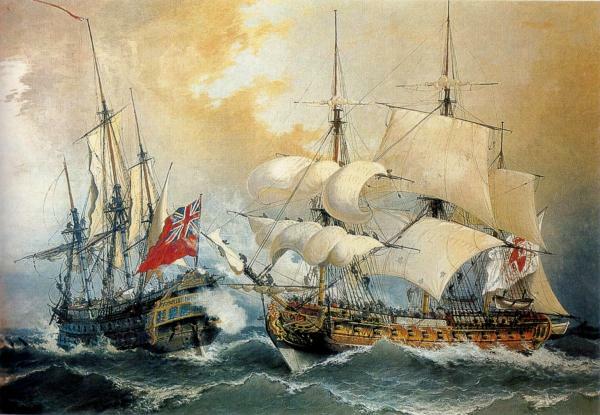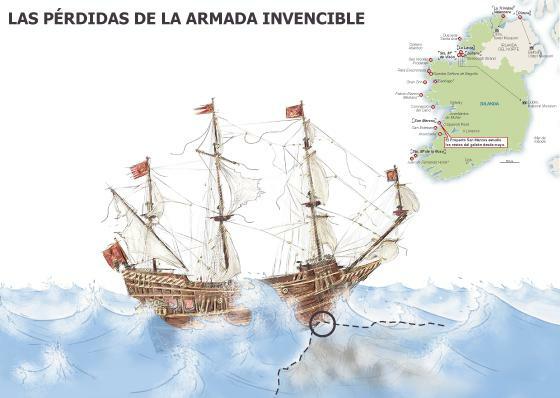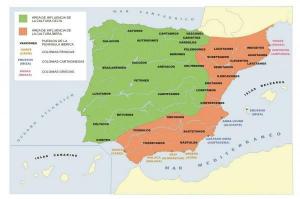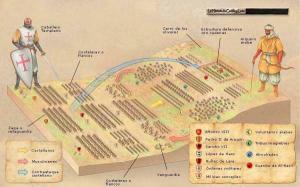Why the Invincible Armada failed

Image: study history
During the reign of Philip IISpain was the largest empire in the world with so many territories that it was said that the Sun never set on the empire. But during the last years of the reign of Felipe II, a series of events caused the Spanish Empire to lose power. Undoubtedly one of these events is the defeat of the Invincible Armada against the English, so today we are going to talk about why the Invincible Armada failed.
Although we have already talked about the invincible armyIn other lessons, it is necessary to summarize what this fleet was to understand the causes that led to its failure. The Invincible Armada is the term the English use to refer to a naval campaign that the Spanish carried out against the United Kingdom in 1588. The main reason for the attack was that the King Philip II she wanted to dethrone Elizabeth I from the English throne, after not having been able to possess the English regions in any other way.
The attack can be included within the battles that took place in the great conflict that was the Anglo-Spanish War, which lasted from 1585 to 1604. In this war some of the
most important battles of the history of both countries, such as that of the Invincible Armada, that of the Counter-Navy, or Drake's attacks on the Spanish coasts. War ended with the Treaty of London, signing the peace between Spain and the United Kingdom.The Invincible Armada has become, for all this, a popular referent, being one of the most famous battles in both Spain and the United Kingdom, and overshadowing other important battles such as those of the Counter-Navy.

Image: The Country
To continue this lesson on why the Invincible Armada failed, we must talk about the different causes that caused the great defeat. We are going to divide the causes into internal and external, the first being those caused by Spain, and the second being those caused by the English and other external factors.
Inexperience
They are very numerous and mainly respond to the inexperience of the Spanish and different unexpected problems that were happening while the attack was planned. One of the main causes was the inexperience of Spain in naval campaigns. Although Spain was a kingdom with a lot of maritime trade, their ships weren't that powerful like those of other regions.
The great Spanish army based its great military power in the infantry, with one of the best land armies in the history of mankind. This caused that there were not too many general experts in naval combat, nor a large fleet.
Slow attack
Another cause was the slowness of the attack. At first the main idea was to carry out a lightning attack, looking for a surprise attack to try that England did not have time to prepare the defense. Due to the slowness of the construction of the fleet, and the change of general due to the death of Álvaro de Bazán, the attack was delayed. Such was the slowness of preparation, that the entire English court was already aware of the attack long before the Invincible Armada left Spain.
Changes in the upper echelons
An important cause was the change of general Due to the death of Álvaro de Bazán, his replacement being Alonso Pérez de Guzmán, someone who was said to get seasick and did not have any experience as a naval general. The inexperience of the Spanish generals in the naval field meant that there were not many other options as an admiral either.
Very poor fleet
Another important cause was the deficient construction of the fleet. The fleet was very recent, built thanks to the money of America, having been manufactured in a very short time, looking to quickly attack England. Guzmán himself had warned the king of how deficient the fleet was, much more so when compared with the advanced English ships.
The Spanish ships were very large, and looked fearsome, but the English ships were much more skilled and lighter. To this was added that the combat resources were not very high, which was shown when in the first encounter with the English, almost all the ammunition was exhausted, most of which was quite faulty.
Coordination problems
The last cause was poor coordination. From the first moment the control of the times was horrible, partly because of the bad weather. This caused a lack of coordination with the Flemish allies, causing the Spanish fleet to have to wait for them for a time in Calais, where the great defeat would arrive.

Image: Slideshare
The external causes were mainly of two types, those related to the English and those related to climatology.
Great English fleet and good strategy
The English based their great military strength on naval battle, since they knew that their great position as an island allowed them a great defense against the rest of the European powers. England had a large fleet, based on the use of small boats much more manageable than the big Spanish boats. That great fleet was led by some of the best naval generals in history such as Charles Howard, one of the most responsible for the defeat of the Invincible Armada.
To these naval generals must be added to the corsairs, pirates who had the support of the queen and that they collaborated with the English army in the battle. Among the corsairs must be named Francis Drake, who defeated the Spanish on numerous occasions and is considered a great hero to the English, being possibly the most responsible for the end of the Armada Invincible.
Weather problems
On the other hand there are the climatological causes, since the Navy marched in a time with great weather problems. From the first moment it was seen that the sea was not calm, since when the Spanish fleet passed through Coruña it had to disperse through a gale. The fleet was slow to regroup, losing even more time to begin the attack.
In addition, the wind caused that from the Spanish coasts to the English several boats were lost, that were changed of direction by the winds. The bad state of the sea, and the winds that caused great changes of direction made it very difficult to navigate, even more so for generals with as little experience as the Spaniards.



